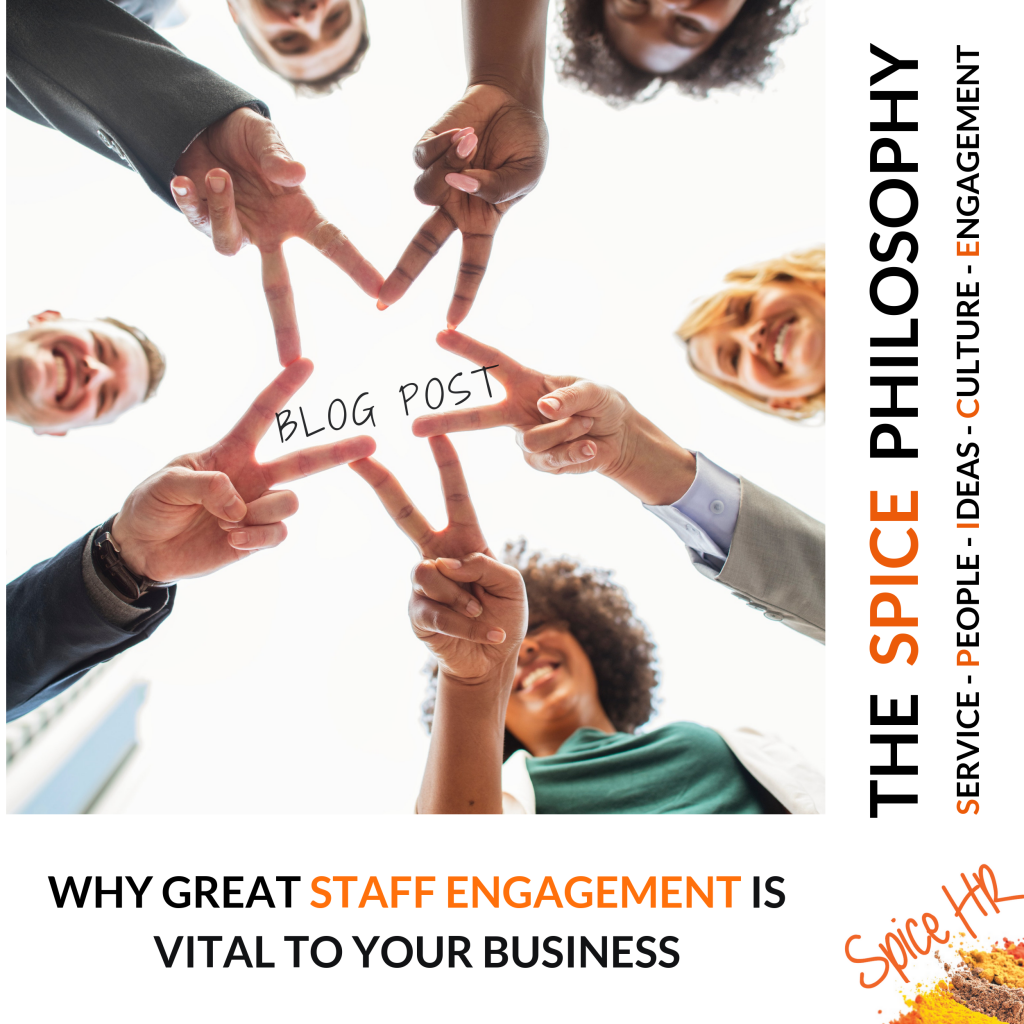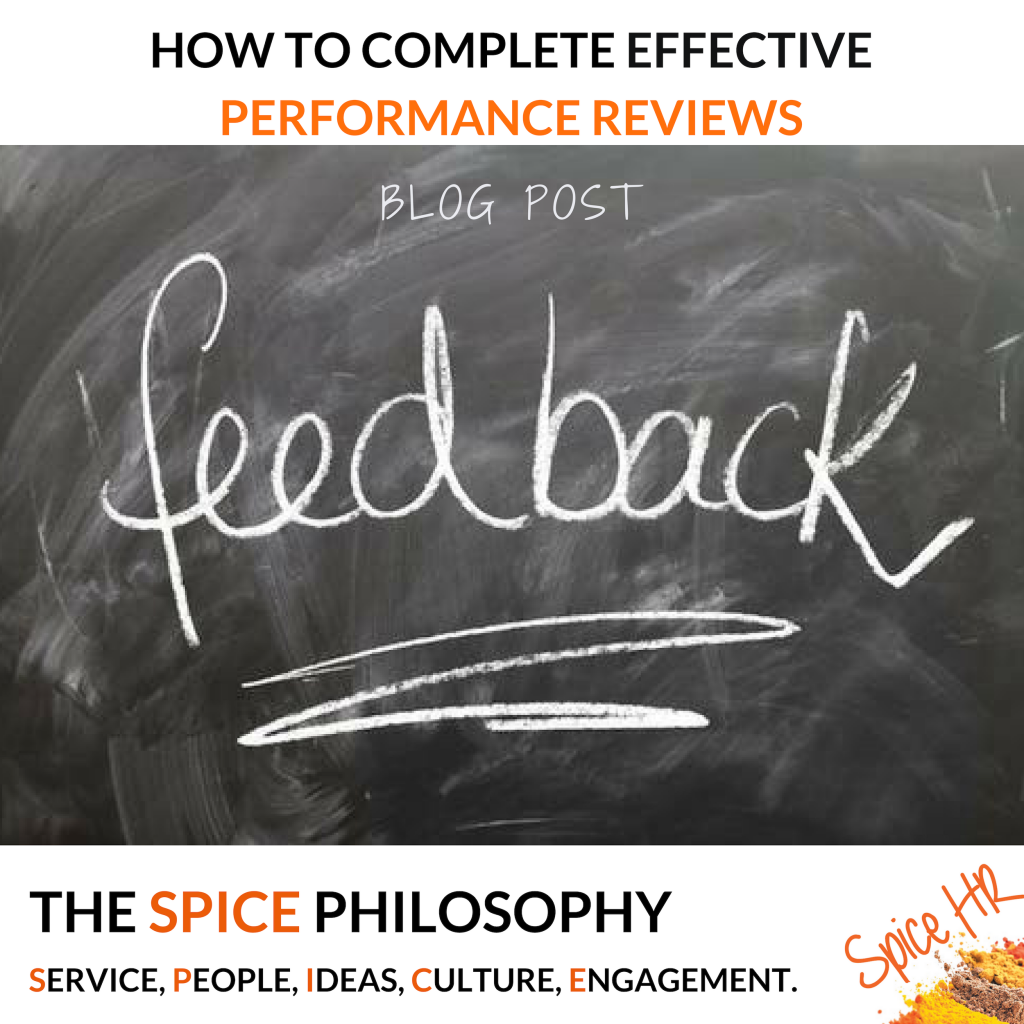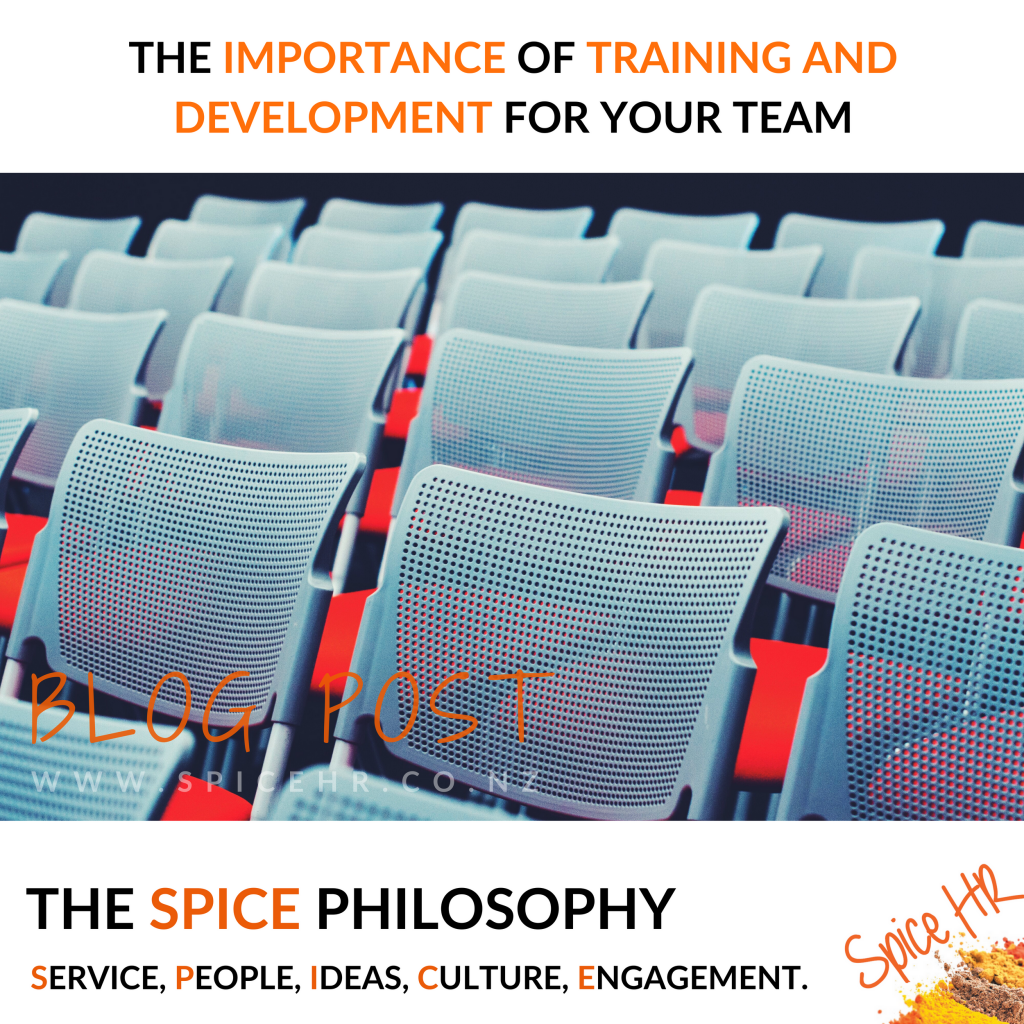Workplace relationships – yay or nay?
Workplace relationships – yay or nay?
Posted by Breakfast on Monday, February 25, 2019
Why Great Staff Engagement is Vital to Your Business
 If you had the choice, would you rather eat a bowl of plain rice or a delicious, spice-filled curry?
If you had the choice, would you rather eat a bowl of plain rice or a delicious, spice-filled curry?
Sure, the plain rice would satisfy a need and ease your hunger pains, but that is all. The curry would not only satisfy those hunger pains, but also provide you with the added bonus of enjoyment and nutrition.
Why are we talking about curry?
Well, it displays the difference in attitude you can receive from your team. The plain rice team will show up to work for their pay, to tick the boxes and go home again. However, that spicy curry is the team that is engaged and invested in not only their own success but that of the company too.
They both technically get the job done. The plain rice team will be just fine. But to take your business to the next level, you need a bit of spice. And how do you get it?
Staff Engagement!
Staff engagement should not be considered a buzzword. It packs a powerful punch that can level up your business, and create a productive and happy work culture.
While the concept can seem overwhelming, in reality, staff engagement doesn’t have to be complicated or expensive. It often comes down to simple processes and gestures that you can weave into your workplace.
So, sit back and read on to find out why staff engagement is so important. We will also explain how you can boost it in your business.
What Does Staff Engagement Look Like?
Staff engagement is more than saying hello when your team walk in the door in the morning. It is about investing in your team so that they invest themselves in your business.
Engaged employees don’t just show up. They are focused, energised, and productive. They also tend to go above and beyond in their work, as well as in their attitude. They are invested in the success of the company.
More than merely being satisfied and happy at work, engaged staff are passionate about it.
Why Is It Important?
An employee who is invested will try harder, volunteer to take on more, work faster and be more creative. They are great ambassadors for your business, helping to lift customers and other team members with their hard work and positivity.
Employees who are just there for the money are more likely to jump ship. Give them a reason to stay that is less about money and more about purpose.
If you need more motivation, consider the fact that businesses who put effort into engaging employees can outperform those who don’t by up to 202 percent!
How to Encourage Staff Engagement
Great staff engagement does not happen by accident. You will have to put in some work to build the kind of culture you want.
Try some of these ideas…
- Make it a constant part of your culture from the top down.
- Clearly communicate your company’s vision and purpose with employees. Explain your “why” and connect them with the part they play in achieving it.
- Measure engagement regularly in a meaningful and authentic way (once a year surveys capture a moment in time, not an overall picture).
- Listen to your employees. Provide a safe, confidential feedback loop to hear their honest views.
- Support your team to grow and learn no matter what level they are at.
- Maintain an open and honest management style to inspire trust.
- Support work-life balance with flexible work schedules and encourage breaks and downtime to refresh.
- Get to know your employees as individuals, not just workers. Connecting with colleagues on a social level is one of the most significant aspects of creating engagement.
- Invest in building strong team relationships through social activities or team bonding exercises.
- Offer incentives and rewards for hard work, and cater them to the individual where possible.
- Acknowledge and celebrate success as a team.
- Hire the right people to fit with the culture of your business.
- Appreciate and celebrate your team, not only in their professional goals but personal as well.
- Make your workplace fun! Encourage laughter, and think of ways to help them blow off steam after a hard week.
Staff engagement is not just about a pool table and free coffee in the break room. More than an afterthought, it is something that should be a part of your company’s ethos and culture.
Modern workers are looking for meaning and purpose. Provide those things, and you will enjoy all the perks of a healthy, innovative and productive business.
Are you a bit stuck on how to instill this culture at your workplace? Then get in touch with us here at Spice HR. Encouraging great staff engagement is one of our specialties!
Our Spicey Perspective on the Domestic Violence – Victims Protection Act

We’ve recently heard some negativity around the new Family Violence legislation. There seem to be concerns that this legislation is unnecessary, will end up being costly to employers, and is open to abuse, much like sick leave can be seen by some as an extra 5 days of leave, a given right. Here’s our thoughts on this which will hopefully provide a little perspective.
The Statistics
Family Violence is a very real problem in New Zealand. We have the highest rate in the developed world, our police attend around 200 family violence incidents a day, and despite this they estimate that only 18% of family violence is actually reported. About half of the homicides and violent crime in NZ are due to family violence.
The Reality
However, people who are impacted by family violence mostly don’t talk about it. It is extremely difficult for them to ask for help. They often feel shame, and believe they are at fault. If they have reached the point where they are asking for help, you can be sure they are pretty much at the end of their tether.
In terms of the risk of false claims, we believe this is extremely unlikely, mainly because of the stigma associated with family violence. Whilst it’s true that some people fake illness in order to take sick leave, we believe the likelihood of people faking being a victim of family violence is minimal. For most people, this is as hard to imagine doing as lying about having cancer. And remember, employers still have the right to ask for proof if they have genuine doubts.
We believe that in reality the impact on businesses will be minimal. Certainly the businesses that already offer this support (e.g. The Warehouse Group and ANZ) report that employees do not lie about being victims of family violence.
More importantly though, what’s the impact if we don’t offer this support? If you have provided a safe enough environment that someone being abused feels they can ask for help, your actions may end up saving their life. If you don’t, one of your staff members could become another statistic. It’s real. These are your people. Keep them safe.
If you’re keen to make this legislation change into a positive for your workplace, then feel free to get in touch with us here at Spice HR. We can help you to establish a policy and processes that work for you. Drop us a line today.
How to Complete Effective Performance Reviews

Do you groan when the time for performance reviews roll around?
You are not the only one!
Shocked? We didn’t think so. Managers and employees alike dread the traditional annual employee review, which has persisted throughout the business world for decades.
What might surprise you is that the traditional way of conducting staff reviews is not only a total drag, but it is ineffective, if not downright bad for business.
Research shows that a whopping 30 percent of performance reviews actually decrease employee performance. Oops!
But just because the old style of review has become irrelevant to a modern workforce, it doesn’t mean the process should be scrapped entirely. There are plenty of ways to reinvent and adapt your staff reviews so that they are quick, easy and infinitely useful for your employees and the business.
Here is what you can do…
How to Complete Effective Performance Reviews
Give Prompt and Regular Feedback
Scrap the idea that performance reviews should only happen once a year at a formal sit down. There are so many reasons this idea just does not work, such as:
- It is difficult to summarise a whole year in one review, especially if items you want to discuss took place months ago
- It is stressful for all parties
- Feedback is commonly only from one person (who may be unwittingly biased)
- There is little feedback or follow up during the year
- Managers suffer from “the recency effect” (only recollecting events from the last few months rather than the entire year.)
Staff reviews should be about coaching and developing your staff, not just reviewing past performance. Employees want immediate feedback – even if it is negative. The quicker you can provide feedback, the more likely it is that you can change (or reward) behaviour – resulting in a higher performing individual.
Mix It Up
You don’t have to trash the entire concept of the annual staff review. When combined with regular informal catch-ups and slightly more in-depth quarterly conversations, it can be a valuable tool to sit down with your employee and renew their goals and aspirations for the year ahead.
Just make sure it is supplemented with those regular catch ups!
Ditch the Numbers
Trying to condense an entire person’s work ethic, success, challenges, goals and behaviours into a single number or rating is not only one-dimensional, but it is also ineffective. Numbers tell you very little about the growth or development of an individual.
Instead, focus on capturing information in a more expansive way. Don’t be limited by a score. The key is providing honest feedback on all areas of their performance. You can tell very little from a number on a page. But real constructive feedback can work wonders.
Keep It Positive
It is no surprise that 90 percent of employees are more motivated by positive feedback than “constructive feedback.” Managers who are afraid of conflict might save up all their unpleasant conversations to have at a performance review – preferring to get it all out of their system in one go. But a staff review should focus more on the good than the bad.
Take note of all the good things that your team do. Not just their work, but their attitude around the office, how they help their colleagues, even if they pitch in to clean up the break room. Positive reinforcement is really helpful and will help make performance reviews so much more manageable.
Look Forward, Not Backwards
If you are providing feedback to your staff on the spot as it is needed, then reviews can be used more as “previews.” Spend time with your employee creating goals and objectives, rather than spending an hour rehashing old material.
That switches the focus from the past to the future. Talk openly about their goals for the year if they want to upskill and if there is the chance of more responsibility and progression. They will leave feeling energised and ready to take on the year head.
Listen Don’t Lecture
This is a conversation between two people. And part of being a good conversationalist is to listen openly. Allow your employee to lead most of the discussion, and listen more than you speak. This shows them that you respect and value their opinion. It will ensure they feel a valued member of the team.
Include the Rest of the Band
Studies show that often, reviews and ratings are more reflective of the person doing the rating than the person being rated. Translated, that means the manager may have biases (even if they’re not aware of them). To avoid this, and get a well-rounded, more accurate insight into a person’s performance, bring in peers and other managers, or even request customer feedback for a 360-degree review.
If you are still groaning and scratching your head about the performance review process then feel free to get in touch with us here at Spice HR. We can help you to establish a review process that works for your workplace. Drop us a line today.
Using Emotional Intelligence To Become An Inspiring Leader

Today’s work culture is vastly different from that of only a few decades ago. The old-fashioned style of management is falling from grace, replaced with a more values-based system. This system favours leadership with a strong focus on emotional intelligence.
Gone are the days where a bullying “manager” inspired obedience through fear. Good businesses now understand that to be genuinely successful, leaders need to build trust, empathy, and respect.
While managers have people who work for them, leaders have people who willingly follow them. This may sound like a subtle difference, but it has a significant impact on morale, motivation, and productivity.
Let’s explore the difference and how you can make an impact with emotional intelligence at your workplace.
What is Emotional Intelligence?
To be able to use it well, you first need to know what it is! So, what is emotional intelligence?
In a nutshell, emotional intelligence is the maturity, insight and empathy required to effectively understand and manage your own emotions, as well as those of the people around you. Rather than flying off the handle in sticky situations, you can take a step back and avoid making emotionally charged decisions.
It is professionally thinking with your head, as opposed to being driven by your emotions. Good leaders have this quality and inspire their team to make good decisions also.
Why is Emotional Intelligence Important for a Leader?
Although technology has come a long way, most workers are not yet robots. Each individual requires a different approach. A good leader aims to inspire and motivate his or her team, know their strengths and weaknesses, and understands which approach works best to unlock each person’s full potential.
This is where emotional intelligence comes in. Identifying personality types, emotions, communication styles and getting buy-in can be achieved by using your skills of empathy and intuition.
However, it is not simply all about the feelings and emotions of others. Inspiring bosses lead by example. They are not afraid of tricky conversations or situations because they have the self-awareness and confidence to handle whatever is thrown at them.
The way you handle yourself will trickle down through your teams. Your management “flavour” dictates the overall flavour of the business. If you are spicy and hot-headed, your work environment will mimic this. Whereas if you are strong, yet calming – like a soothing cup of tea – the culture will eventually feed off this vibe and start to reflect it.
Management vs. Leadership
Now that you understand the concept of emotional intelligence, let’s look at how you can use it as a Leader in your workplace. There are very negative connotations around “management”. Managing and leading are two very different things. From your own experiences, you may be able to identify with some (or all) of the examples below:
- Managers may force people into following policies and getting things done. Leaders encourage people to believe in the journey.
- Managers often toe the line and follow regulations to the letter. Leaders can think outside the box and aren’t afraid to try a different tack for the good of the team and the business.
- Managers can choose to use the “carrot on a stick” technique to get results. Leaders inspire success by capturing people with their vision and helping them understand their role in the bigger picture.
- Managers often feel the need to “micro-manage” people and projects, constraining creativity. Leaders understand the need to take a step back and trust in their team. They work to people’s strengths.
- Managers may have an ego about needing to be the expert on everything, not allowing people to grow and shine. Good leaders know that passing the ball and letting other people’s experience and insights shine is crucial for the growth of not only the team, but the organisation.
It’s widely known throughout the business world that employees don’t quit companies, they quit managers and bosses! Take a look at your business and ask yourself: are you merely telling people what to do, or are you inspiring them to follow your lead?
Answering this question alone can be tricky. That is where the team here at Spice HR can help. Building a great workplace culture will encourage emotional intelligence and excellent team contribution. And that is exactly what we can help you do at your workplace. Get in touch with us today.
The Importance of a Mission and Company Values in the Workplace

Does your business have a mission? Is there a strong set of company values clearly set out that describe the reason for its existence? We are not just talking a couple of sentences containing corporate jargon at the top of your business plan to make it look fancy.
What we are talking about are the meaningful, powerful principles that unite your team and produce the drive and common purpose that is essential to any business.
Your mission and company values set the tone for your entire business culture. They can be powerful tools to guide decision-making, attract and retain top performers and build an invincible team environment. If you don’t have these in place, then your team and business may not be performing to its full potential.
Let’s have a look at the importance of missions and company values in the workplace, and why it is worth the investment to get them right.
The Importance of a Mission and Company Values in the Workplace
The Purpose of Your Business
So, you know the basic purpose of your business, right? Maybe it is to sell tyres or help people invest their money. Knowing your purpose is the basic starting point. Then you need to look beyond your purpose to discover the next level. Your mission and values are about how and why you do something, not just what you do.
Why is it important to get clear on this?
A solid mission and clear company values will guide every aspect of your business. They will help you and your employees make consistent decisions that align with the business, as well as drive the outlook and behaviour of every individual in the workplace.
The Importance of the ‘Why’
When everyone on your team understands their “why,” there is a kind of magic that happens. People are united, work relationships are generally strong, and everyone works towards that delicious common goal.
In contrast, if your values aren’t aligned, you will find people working against one another, job satisfaction and productivity declining – and bam, your business will suffer because of it.
Think of it like trying to insert Baby Spice into a thrash metal band. While an entertaining thought, it is a match that just isn’t going to work out. That is because (presumably) the performers have vastly different values and goals.
Giving People Something to Strive For
Today’s employees are looking for more than just a pay cheque. They want a sense of purpose to give their work meaning. If a salary is your employee’s only motivator, they aren’t going to be personally invested in the success of your business and will move on to where the money is.
Conversely, those that believe in your mission and values are engaged, positive, and will go above and beyond in their day to day tasks.
This is particularly true in the case of Millennials and Generation Z. Numerous surveys and studies have shown that the majority in these generations prefer to be led not managed, and want to make a difference. Having a sense of purpose is hugely important to their loyalty.
Trust and Transparency
Having a crystal clear mission and company values also creates much-needed transparency and trust between management and employees, building accountability.
It tells potential employees who you are and what it would be like to work for you, so a powerful mission can attract high performers who share your passion.
Lastly, but of equal importance, the reputation of your business will only be enhanced by abiding by these key values and working towards that admirable end goal. Engaged employees who understand and buy into the culture of your business will be passionate about communicating it to customers and clients, boosting your reputation and enhancing customer satisfaction.
Setting Your Mission
As you can see, creating your business mission and company values should not be something you dash out in a 10 minute smoko break. They need careful consideration.
Your mission should drive your business. It is what you do – the core of the business – and from it comes the objectives and finally, what it takes to reach those objectives. It should be something that aligns with your overall purpose. But most of all, it should be genuine. If you choose a mission that you feel you should have, rather than one that resonates, then it will not have the impact you want it to. So, select something that your business is passionate about.
If you are having some trouble developing the process around your company values or even the mission itself, then get in touch with us here at Spice HR. We can help you to get everything down on paper and then implemented within your team. Drop us a line today.
Christmas Parties – The Good, The Bad, and the Ugly!
 Love them or hate them, work Christmas parties are an important part of the end of year festivities. Often, they turn out to be some of the most memorable occasions of the year. Though not always for the right reasons. Office parties are infamous – both in movies and real life – for being the scene of scandals and hijinks that turn into office gossip well into the new year.
Love them or hate them, work Christmas parties are an important part of the end of year festivities. Often, they turn out to be some of the most memorable occasions of the year. Though not always for the right reasons. Office parties are infamous – both in movies and real life – for being the scene of scandals and hijinks that turn into office gossip well into the new year.
They don’t have to be that way. There are many options for end of year celebrations that don’t result in hangovers and photocopying random body parts!
An office party is a great occasion to relax a little, give thanks to your team for a great year and relate to one another as people, not just colleagues. It doesn’t have to get messy or downright damaging. Approached correctly and planned well, everyone can enjoy a work Christmas party with just the right amount of spice!
Let’s dive right in and holler at the good, the bad and the ugly side of work Christmas parties!
Christmas Parties – The Good, The Bad, And The Ugly
The Good
Don’t underestimate the importance of hosting an end of year gathering for your team, even if it is just a beach-side BBQ or a bowling night.
A Christmas party is the perfect way to celebrate and acknowledge the year of hard work that has been put in by every employee. It wraps the year up on a positive note and motivates staff to bigger and better achievements for the coming year!
But it is not just about a celebration. Giving your team a chance to socially mingle out of the office environment helps to build strong team relationships. It gives managers a chance to see their employees in a different light, and shows employees that their managers are real people too.
To keep it a positive experience, plan a celebration that the majority of your team will enjoy. Get creative about what you could do – painting artwork, rock climbing, a city scavenger hunt, an exotic cuisine, or even an escape room. Keep in mind the capabilities of your team members, you don’t want to choose something that will isolate certain people.
Recognition, rewards, and the chance for some fun will build staff engagement, loyalty and create a fantastic work culture.
The Bad
As much as you want to be all about fun and positivity, there is no denying that work parties can be dangerous territory. The mixture of alcohol and the chance to drop some of those rigid office personas may come with some unwanted side effects.
In advance of any festivities, make it clear to your team that the same standards of behaviour are expected at office functions as within the workplace.
It’s important to remind your employees ahead of time that sexual harassment, bullying, discrimination, drugs, and health and safety policies are still in place and they need to keep these things in mind. In fact, it may be a great idea to do some refresher training on some of these issues before the silly season hits.
At the same time, set everyone up for success. If you are serving alcohol, make sure consumption is closely monitored and provide healthy and hearty food to soak it all up. Make sure you provide non-alcoholic options and lots of water to keep things under control.
Arrange for transport options or encourage carpooling with a sober driver on the day of the event. Be a responsible host, as you would with any party.
The Ugly
With the correct planning and foresight, it doesn’t have to get ugly! When planning your Christmas party, put some thought into the kind of team you have, the culture within the team, and what event is best suited to encourage team building for a great night out – without any nasty hangovers of any kind.
If things do start to get out of hand, ensure any undesirable behaviour is dealt with swiftly and appropriately. It is also really important to follow up with any problem team members when you are back to work after the event. Take any disciplinary measures required. Just because it is a Christmas party, it doesn’t mean there is a free pass for rule breaking!
One final spicey thought… don’t forget to add one or two classic Spice Girls tracks to your dance playlist – we guarantee there are a few closet fans who will love it, or at the very least, people can bond while complaining about the music!
If you have any concerns about the HR aspect of planning your end of year function, then don’t hesitate to get in touch with us here at Spice HR. We are happy to help you nail the red tape side of things!
What Is Your HR Data Telling You About Your Business?

Data. Many people think of it as numbers that someone rapidly types into a spreadsheet and then uses a complicated formula to calculate something.
But data comes in many forms. Including HR data. That is data that you can use practically in your business to tweak processes, increase staff morale and look after your people better.
We tend to think that if the Spice Girl’s management team had spent more time analysing their HR data, the band would not only still be together today, they would have a level of success to rival the Beatles…
Okay, maybe not. BUT they may have been able to stretch the gig out a little longer, keep their most talented members – ahem, yes, there were a couple! – from jumping ship early and had a much more positive team culture.
How are the Spice Girls relevant to your business? Well, HR is so much more than just crunching numbers, dealing with disputes and endless piles of paperwork. In fact, HR analysis is a rapidly growing field of expertise that modern, successful businesses are using to their advantage.
Let’s look into how you can use this data in your business.
What Is HR Data And How Can You Use It?
There is plenty of useful information in your HR functions if you know where to look for it. Using the data you collect from performance reviews, exit interviews, training information, staff satisfaction surveys, staff retention and even sick days, you can make smart decisions that add immense value to your business.
HR data collection is not a new thing, but utilising it effectively – if at all – is a relatively recent advancement. It is all well and good conducting exit interviews and monitoring sick days, but what is the point if you don’t use that information? It’s like buying a rack full of spices to improve your cooking and leaving them sitting in the back of the cupboard.
The key to using this information to drive success is knowing what to look for. Is there a specific issue or question you want an answer to? Do you want to know how to reduce absenteeism, evaluate staff training, or predict which new hires are going to stay the distance? HR professionals can nail down the questions, use the freshly gained or existing data to do all of these things and more.
Here are just three things your HR data will tell you if you know how to ask:
How To Retain Your Top Talent
Does your data suggest that once your employees become proficient at their jobs and reach a certain level, they will leave? Then it is time to dig a little deeper to find out WHY this happens. Then you come up with solutions to keep your top achievers on board, such as more opportunities and training, or a better work environment.
You will only find out the reason for their departure by asking them. We suggest conducting an exit interview with each team member that leaves the company. Not all will be leaving because of the happenings at your business, some will leave for personal reasons. But, you can find out a lot about the culture, processes, work environment and available resources by asking people their opinions.
How To Keep Your Employees Happy
Everyone knows that a happy employee is a productive, loyal employee. Do you really know if your top performers are satisfied with their work?
If not, find out. You can look at absentee rates between departments or individuals, assess who your most efficient team members are, then use those insights to make improvements. The bonus of a happy workforce is staff retention, which saves big money on recruitment and increases efficiency.
You can also ask your team to answer some survey questions. To find their true feelings, you can make it anonymous. You just need to ensure that you are asking the right questions to get the targeted data that you need.
Assess Performance
Did Posh Spice work harder than Baby Spice? Did Sporty bring in more money than Ginger?
They are important questions to ponder within your own team. If you know which employees work faster and produce a higher quality of work, you can aim to replicate that productivity across the board. A key thing to understand is, what is making them so much more efficient than the rest of the team?
Once you understand that, you can act accordingly. It might mean offering further training for underperformers, boosting staff morale, offering flexible working conditions, team building, or any number of other things.
If you would love to access the hidden gems in your HR data but you aren’t sure where to start, then give us a call here at Spice HR. We can help you sift through the information and boost business at your place. Get in touch today.
The Importance of Training and Development for Your Team
 Do you groan at the thought of training and development for your staff? So much time, so much money, so much energy, so much effort has to go into training right?
Do you groan at the thought of training and development for your staff? So much time, so much money, so much energy, so much effort has to go into training right?
But have you thought about what you can get out of it?
Training and development does not only offer benefits to your team members, but it can do wonders for your business as a whole. Let’s have a look at why training and development should be a vital part of your plan for each year.
Why Training and Development?
The initial training of a new team member is a given. After all it is vital that they know how to perform their role safely and effectively to begin with. But is there a need for training after that, surely they already know how to do the job?
We find the need for ongoing training is a constant debate in businesses. Is it worth the investment? We say wholeheartedly yes! And here is why…
Standing Still
You would not dream of letting your business stand still. To let it go about its daily functions without some forward planning. You strive for growth and improvement so that it continues to be successful. So why would it be any different with your team members? Regular staff training is essential for the skill development that will help your business to grow.
Industry Changes
Industries are constantly evolving and changing. If you don’t keep up with their changes then you will get left behind. Legally you need to make sure you are on top of regulations and you won’t be able to do that without updating the knowledge of your team. Technologies change on a daily basis, so a one-off training session is not sufficient. All of your team members should be comfortable with the available technology and know how to use it to its fullest capabilities.
Stay Ahead
If your business is not progressing forward, then it is highly possible you will be passed by your competitors. By constantly advancing your team, you can ensure you remain competitive in the marketplace.
Highlight Skill Gaps
If you are on top of your training it will be easy to identify any gaps in the market, or gaps within your existing team. Identifying these gaps early means that you can train someone to fill them and your business will not have to suffer for it.
Advance Team Skills
Once an employee has learned the basic skills required for their job, you can easily build on their knowledge with ongoing training. This allows them to cement the knowledge they already have and build upon it. Team members that know more and have more skills, have more to offer your business.
Increased Job Satisfaction
Staff morale is an extremely important component of your business. If it is low then you will have unmotivated and unproductive staff who try to get by with minimum effort. However, if your staff morale is high, your team will enjoy coming to work and will put in their best effort every day. Ongoing training shows that you value your staff. Allowing them to advance their skills will give them greater job satisfaction and keep the morale high at your workplace. Everybody wins!
Staff Retention
It is human nature to want change and progression. If you can offer your team opportunities to progress within your business, then they will want to stay with you. That means you minimise the need for recruitment – a costly and time-consuming process. By internally promoting existing staff you can ensure they have a comprehensive knowledge of your business. You also know their work ethic and that their skills are suited for the role.
Attract New Talent
Your team members are the backbone of your business, they are your most important asset. By having a reputation as a business that provides ongoing training, you will be able to attract the best staff from the beginning and retain them.
As you can see, ongoing Training and Development of your team has many benefits to your business. But sometimes it can be difficult to know how to implement such a programme at your workplace. If you need some guidance on how best to establish an ongoing training programme, then get in touch with us here at Spice HR.
Training and Development is something that we are truly passionate about and would love to help you implement the right kind of programme for your business. Get in touch today for a no-obligation chat!
Do you have one of these …?

Sometimes you’ve just got that ONE staff member!
For tools and ideas on how to manage all types of personalities, call the Spice Gals!